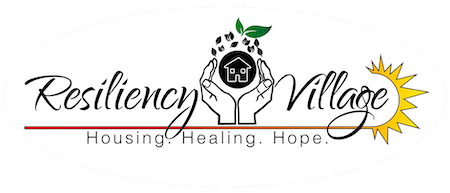 Resiliency Village, a volunteer-driven effort launched earlier this year to establish a community of tiny homes for people living without shelter in Tuolumne County, celebrated a milestone on Monday with the delivery of its first 200-square-foot house.
Resiliency Village, a volunteer-driven effort launched earlier this year to establish a community of tiny homes for people living without shelter in Tuolumne County, celebrated a milestone on Monday with the delivery of its first 200-square-foot house.
The house arrived from Fresno before noon at a property on Peaceful Valley Road in East Sonora. It was purchased thanks to an anonymous donation of $10,000 that Resiliency Village received about a month ago.
“Having our first tiny house is really quite amazing,” said Shelley Muniz, of Willow Springs, who’s part of the group that’s behind the project. “I’m really excited for the community to see the quality that’s going to be involved in the tiny houses that we put on our property.”
Muniz said the home will be used by the group as a demonstration model over the coming months to raise funds and get community support.
The house, produced by Hickory Sheds in Fresno, contains two lofts and cost the group $6,500. They will use additional money they’ve raised through donations to retrofit the house with plumbing for a small bathroom with a toilet and shower, as well as a small kitchen.
“We’re trying to restore dignity for people,” Muniz said.
Muniz is working on the project mainly with Mark Dyken, of Vallecito, and Brenda Chapman, of Soulsbyville.
All three have spent most of their careers involved with public education in Tuolumne County and seen the long-lasting effects of trauma on children, which is why they want the Resiliency Village to include a trauma and healing center that will provide on-site services to residents.
“If you go to the camps and listen to people’s stories, a lot of that has to do with trauma when they were children,” Muniz said of people living in homeless encampments on the outskirts of the City of Sonora and other places throughout the county.
For example, Muniz talked about a recent experience while helping with a garbage clean-up day at the homeless camps off Stockton Road in Sonora.
A woman who lives at the camps asked the volunteers why they were there and what was in it for them, to which Muniz said they told her that the residents of the camps are their neighbors and friends.
Muniz said the woman began to cry and said, “I’ve never heard anyone call us neighbors or friends before. For the first time in a long time, I feel like that could be true.”
“We’re not trying to give people things or keep the cycle of homelessness going, we’re trying to create a solution together that includes our unsheltered neighbors,” Muniz said. “Some of them will be on our advisory committee because their opinion is very important. They’ve been there, they know.”
There’s a growing number of similar neighborhoods of tiny houses being established in places throughout the United States to combat homelessness, though Chapman said Resiliency Village would be the first she knows of to be centered around a trauma center.
Chapman visited several villages in Texas and Oregon for research purposes earlier this year. She said they want Resiliency Village to be something the community can take pride in.
One village in Dallas, with 50 cottages, was expected to save the city $1.25 million a year in reduced costs associated with people being homeless.
“We believe it’s imperative that we as a community help our unsheltered citizens find a dignified place to live, so they don’t try to exist in a way that’s not the optimal situation for them or for our community,” she said.
A survey conducted in January counted 418 people who were homeless in Tuolumne County at that time, more than double the number from the same month in 2017.
The amount was significantly less than the 711 homeless people who were counted in September 2017, though the numbers are typically greater at that time of year compared to winter.
California Gov. Gavin Newsom’s state budget for the next fiscal year earmarks $1 billion for cities and counties to combat homelessness.
Dyken, Chapman and Muniz recently went to Newsom’s office in Sacramento and met with two of his cabinet officials on housing and homelessness, who told them the Resiliency Village idea was the type of project that the first-term Democratic governor is looking to promote throughout the state.
“They were actually very knowledgeable and interested in our area,” Dyken said. “They told us to get involved with our continuum of care, which we have, and to keep an eye on funding sources from the state.”
However, the group isn’t waiting for money from the state or other government sources to move the project along.
Dyken said they are hoping the demonstration house will help them find other sponsors for purchasing more homes, who could have their name or company name on a plaque on the house they sponsored.
“That’s going to be our model going forward,” he said.
If progress continues moving forward at the current rate, Dyken said they hope to begin housing people later this year or next year.
“There’s probably a whole bunch more to do before we get somebody  sleeping in a bed,” he said. “We’re pretty confident we can have some people housed by the next rainy season if we continue at this pace.”
sleeping in a bed,” he said. “We’re pretty confident we can have some people housed by the next rainy season if we continue at this pace.”
Contact Alex MacLean at amaclean@uniondemocrat.com or (209) 588-4530.
